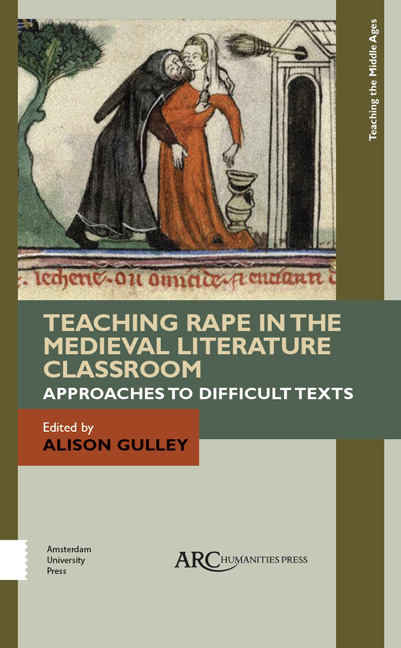Book contents
- Frontmatter
- Contents
- Acknowledgements
- Chapter 1 Introduction: Teaching Rape and Meeting the Challenges of the TwentyFirstCentury Classroom
- Chapter 2 Medieval Saints and Misogynist Times: Transhistorical Perspectives on Sexual Violence in the Undergraduate Classroom
- Chapter 3 Teaching Medieval Rape Culture across Genre: Insights from Victimology
- Chapter 4 Bringing the Bystander into the Humanities Classroom: Reading Ancient, Patristic, and Medieval Texts on the Continuum of Violence
- Chapter 5 From Bystander to Upstander: Reading the Nibelungenlied to Resist Rape Culture
- Chapter 6 Speech, Silence, and Teaching Chaucer’s Rapes
- Chapter 7 Classroom PSA: Values, Law, and Ethics in “The Reeve’s Tale”
- Chapter 8 “How do we know he really raped her?”: Using the BBC Canterbury Tales to Confront Student Skepticism towards the Wife of Bath
- Chapter 9 Teaching the Potiphar’s Wife Motif in Marie de France’s Lanval
- Chapter 10 Sexual Compulsion and Sexual Violence in the Lais of Marie de France
- Chapter 11 Troubadour Lyric, Fin’amors, and Rape Culture
- Chapter 12 The Knight Coerced: Two Cases of Raped Men in Chivalric Romance
- Chapter 13 Teaching Rape to the HeMan Woman Haters Club: Chrétien de Troyes at a Military School
- Chapter 14 Rape, Identity, and Redemption: Teaching “Sir Gowther” in the Community College Classroom
- Notes on Contributors
- Index
Chapter 13 - Teaching Rape to the HeMan Woman Haters Club: Chrétien de Troyes at a Military School
Published online by Cambridge University Press: 23 January 2021
- Frontmatter
- Contents
- Acknowledgements
- Chapter 1 Introduction: Teaching Rape and Meeting the Challenges of the TwentyFirstCentury Classroom
- Chapter 2 Medieval Saints and Misogynist Times: Transhistorical Perspectives on Sexual Violence in the Undergraduate Classroom
- Chapter 3 Teaching Medieval Rape Culture across Genre: Insights from Victimology
- Chapter 4 Bringing the Bystander into the Humanities Classroom: Reading Ancient, Patristic, and Medieval Texts on the Continuum of Violence
- Chapter 5 From Bystander to Upstander: Reading the Nibelungenlied to Resist Rape Culture
- Chapter 6 Speech, Silence, and Teaching Chaucer’s Rapes
- Chapter 7 Classroom PSA: Values, Law, and Ethics in “The Reeve’s Tale”
- Chapter 8 “How do we know he really raped her?”: Using the BBC Canterbury Tales to Confront Student Skepticism towards the Wife of Bath
- Chapter 9 Teaching the Potiphar’s Wife Motif in Marie de France’s Lanval
- Chapter 10 Sexual Compulsion and Sexual Violence in the Lais of Marie de France
- Chapter 11 Troubadour Lyric, Fin’amors, and Rape Culture
- Chapter 12 The Knight Coerced: Two Cases of Raped Men in Chivalric Romance
- Chapter 13 Teaching Rape to the HeMan Woman Haters Club: Chrétien de Troyes at a Military School
- Chapter 14 Rape, Identity, and Redemption: Teaching “Sir Gowther” in the Community College Classroom
- Notes on Contributors
- Index
Summary
Medieval literature professors have probably always been uneasy about their authors’ sometimes ambivalent attitude towards rape and often uncomfortable addressing it in the classroom. But frequently, context and current events conspire to make medieval literature an especially vivid and useful distant mirror of the present. At a time when the country has reached a crisis point of rape awareness both in the military and in schools, the treatment of rape in medieval literature becomes, not a problem for teachers, but a nearly perfect vehicle for addressing the issue with students at a military college.
At the end of 2014, the U.S. Education Department's Office of Civil Rights had cases pending at ninetytwo colleges and universities for possible violations of the law in regards to the way they handle alleged sexual harassment and sexual assaults. It was the culmination of a year in which the issue was frequently in the news. Barely two years before, in January 2012, the documentary film The Invisible War, about the frequency of rape in the U.S. military and how military authorities dealt with it, was released. By the middle of that year, the Department of Defense began to change policies on how rapes were investigated, and by 2013, there were Senate hearings. Besides the government and media attention they have drawn in backtoback years, colleges and the military have much in common when it comes to the traumatic aftermath of rape, and in most respects, the military is a more intensified mirror image of college.
In both cases, the sense of betrayal is strong. At college, if you are raped by a schoolmate, you have been violated by someone with whom you have developed an institutional bond. It is abstract and artificial, and it may not be very strong depending on the individual, but some part of every college milieu, from the freshman year on, is devoted to uniting the students in “school spirit,” a sense of loyalty to the place. Part of that bond is a tacit expectation of trust and safety among peers. If the rapist is not a student but a staff member, the betrayal can be even greater. People have entrusted their children to school officials. For those who still consider faculty and staff to be in loco parentis, an assault by one of them is abuse by a parental figure.
- Type
- Chapter
- Information
- Teaching Rape in the Medieval Literature ClassroomApproaches to Difficult Texts, pp. 183 - 198Publisher: Amsterdam University PressPrint publication year: 2018



